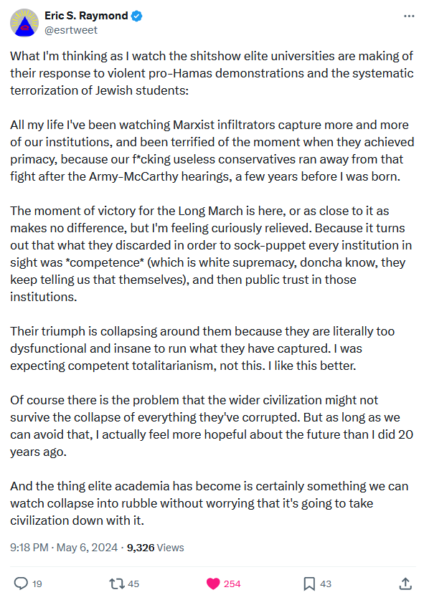There are really only three management books anyone ever needs to read (soon forthcoming, the fourth, my own precis of those three!) and we can use all of them in explaining this.
The Peter Principle tells us that everyone gets promoted to their own level of incompetence. So, that explains why the people actually running HR departments are incompetent. The second is Parkinson’s Law, which everyone usually takes to be about work expanding to fill the time available etc. In reality the book as a whole is about how bureaucracy will eat an organisation from the inside. Like one of those parasitic wasps where the pupae eat the spider from the inside out. The lesson of this is that proper management of any organisation is a constant battle against the growth of the bureaucracy. Proper managers should — must — spend significant amounts of their time turning a blowtorch on that internal bureaucracy. Real slash and burn, proper Carthaginian Solution on their arses.
The third has the most direct and exact relevance here. Up the Organisation. In which we are told that the personnel department (what we had before Human Resources) should be the secretary of the line manager. Someone wants to hire someone? Sure. The person who decides who to hire is the person doing the hiring. He needs an assistant only in so far as someone should phone up the local rag to put the job ad in.
Now, it is necessary to have someone making sure the details for the paycheque are right, that they enrolled in the company equity scheme, health care is sorted. But that’s some beancounter preferably hundreds of miles away from any actual influence upon anything.
All of which — from that distillation of the finest ponderings upon corporate management civilisation has so far achieved — tells us what to do with Human Resources.
Turn the blowtorches on the power skirts. Possibly even the full Carthaginian. Tho’ who we’ll find to buy as drabs and doxies the usual inhabitants of HR is another matter. Dunno, might be worth ploughing them into the fields and selling the salt instead.
Tim Worstall, “The Invasion Of The Power Skirts”, It’s all obvious or trivial except …, 2024-12-06.
March 9, 2025
QotD: HR metastasized
December 20, 2024
QotD: A’s hire A’s and B’s hire C’s
so how does even a little DEI lead to full incompetence contagion? i would like to posit a very simple emergent algorithm rooted in a simple and longstanding organizational idea:
A’s hire A’s and B’s hire C’s. (and you seriously do not want to meet the people C’s hire)
that’s it. that’s all we need to extrapolate and plot it.
this pattern emerges in response to two simple drives affecting all those who lack ability to compete […]
the essence of this is simple: the highly competent (A’s) wish to be surrounded by other highly competent people. an organization of mostly A’s (or at least A’s in management) thrives and gets lots done. it innovates. it rewards achievement and ability. it’s a meritocracy. because that’s what A’s want.
and B’s hate this. they cannot get ahead and they live in fear of A’s beneath them coming for their jobs and hatred of A’s above them who prevent advancement and who make demands for performance.
they do not want their jobs taken, so they respond to this by hiring only those less competent than themselves to work under them (C’s). this is how they hold position and avoid challenge and threat.
ideally, they’d also like to clear any A’s above them out of the way so they can generate some upward mobility. they cannot do this on a meritocratic axis, so they seek another one to supplant it.
they seek to move hiring and promotion to some other quality than ability then reinforce it with doctrine.
the pretext itself is incidental to this process. it does not really matter what it is.
it just has to be “something other than competence” and you land in this self-referential recursive trap.
el gato malo, “the mediocrity downspiral”, bad cattitude, 2024-09-10.
December 5, 2024
We must always trust the experts, say the experts and their journalistic fart-catchers
Glenn Reynolds (aka the “Instapundit”) welcomes Nate Silver to the expert-doubting party:
Well. I was writing about this stuff long before Nate got hip. Back in 2017, just as Donald Trump began his first term, I wrote “The Suicide of Expertise”, by way of responding to Tom Nichols’ book, The Death of Expertise. Nichols’ thesis was that the experts were expert, but that ignorant, superstitious Americans rejected their advice out of insecurity and an unwillingness to be proven wrong. My response was that the experts’ actual track record wasn’t looking so good:
Well, it’s certainly true that the “experts” don’t have the kind of authority that they possessed in the decade or two following World War II. Back then, the experts had given us vaccines, antibiotics, jet airplanes, nuclear power and space flight. The idea that they might really know best seemed pretty plausible.
But it also seems pretty plausible that Americans might look back on the last 50 years and say, “What have experts done for us lately?” Not only have the experts failed to deliver on the moon bases and flying cars they promised back in the day, but their track record in general is looking a lot spottier than it was in, say, 1965.
It was the experts — characterized in terms of their self-image by David Halberstam in The Best and the Brightest — who brought us the twin debacles of the Vietnam War, which we lost, and the War On Poverty, where we spent trillions and certainly didn’t win. In both cases, confident assertions by highly credentialed authorities foundered upon reality, at a dramatic cost in blood and treasure. Mostly other people’s blood and treasure.
And these are not isolated failures. The history of government nutritional advice from the 1960s to the present is an appalling one: The advice of “experts” was frequently wrong, and sometimes bought-and-paid-for by special interests, but always delivered with an air of unchallengeable certainty …
On Syria, experts in Barack Obama’s administration produced a policy that led to countless deaths, millions of refugees flooding Europe, a new haven for Islamic terrorists, and the upending of established power relations in the mideast. In Libya, the experts urged a war, waged without the approval of Congress, to topple strongman Moammar Gadhafi, only to see — again — countless deaths, huge numbers of refugees and another haven for Islamist terror.
It was experts who brought us the housing bubble and the subprime crisis. It was experts who botched the Obamacare rollout. And, of course, the experts didn’t see Brexit coming, and seem to have responded mostly with injured pride and assaults on the intelligence of the electorate, rather than with constructive solutions.
And this was long before the experts’ ne plus ultra of failure, the bungled, dishonest, and downright self-serving response to the Covid pandemic. The pandemic stemmed from experts’ arrogance, in the form of illegal “gain of function” research funded by the U.S. and laundered through Chinese labs, was met with ass-covering “wet market” lies to try to conceal that origin, and then with public health measures, such as lockdowns and social distancing and masking rules, that were backed by no actual science at all, and that were cheerfully flouted by those propounding them whenever it suited their purposes. The final nail in the experts’ authority-coffin, though, was when, after all the lockdown hysteria, they approved massive public marches by Black Lives Matter because, we were told, racism was a public health problem.
Well, so are STDs, but they weren’t encouraging anyone to march against gonorrhea.
Rather they were (ab)using their position to promote the leftist cause du jour. Everyone saw through it, and their stock collapsed.
So. Welcome to the party, pal. Nate’s noticing just how far things have gone downhill.
November 12, 2024
John Carter – “We can all sense the vibe shift”
At Postcards From Barsoom, John Carter tries to explain the “vibe shift” in western culture:

The Course of Empire – Destruction by Thomas Cole, 1836.
From the New York Historical Society collection via Wikimedia Commons.
Underneath the medical tyranny of COVID, the stolen elections, the Internet censorship, the inflation, the hypermigration, the gender psychosis, the polarized rancor of sexual politics, and all of the rest of the symptoms of our decaying mismanagerial order, a countercurrent has flowed through the deep and hidden places of our collective psyche, hot and slow, like a chthonic river of magma rising implacably to the surface.
It isn’t just frustration with the intolerable imposition of Woke into every aspect of our lives, as though we could reset the clock to 90s liberalism and get fresh again with the Prince of Bel Air. It isn’t just anger at the invasion of our countries by the third world, nor is it limited to impatient disgust with the glossolalic babble of an incompetocracy comprised of credentialed midwits who seem to feel that word-shaped noises confer all the legitimacy they need to misrule our countries into oblivion.
It isn’t purely negative.
There’s a sense, somehow, of hope.
Hope, that after decades in which it seemed that history has stalled, that the culture has been frozen in permafrost, that nothing new could ever really be done again, that Nothing Ever Happens, that the only thing we can look forward to is a long, cold decline into technocratic surveillance, demographic implosion, green energy poverty, and final, irrecoverable collapse … hope that maybe this insipid fate isn’t so inevitable as we thought. Hope, that the building tectonic pressure of those buried psychological forces might finally break through and crack the shell of a dead future.
The sudden birth of artificial intelligence and the renewed enthusiasm for the conquest of space are two very obvious signs of this abrupt return of novelty. This is not a purely positive thing – AI is regarded with anxiety by almost everyone, but it is the raw fact of its sudden transition from science fiction to mundane tool of everyday life that is significant here.
There are other signs of this sense of renewal. The proliferation of self-improvement culture amongst many of the youth, particularly on the Very Online Right. The rise of the digital nomad, a modern re-enactment of the Romantic wanderjahr. The quiet birth of the network state, for instance in the form of Praxis. The renaissance of thoughtful, long-form essays right here on Substack. Surging interest in the religious traditions of our ancestors, whether in the form of Orthodox Christianity or paganism. The transformation of warfare by drones, promising a revolution in military affairs every bit as epochal as the firearm. The rise of a contradictorily global sense of national particularism. The steady refinement of 3D printing technologies.
Trump’s victory in 2024 seems a sure sign of this vibe shift. In a plot arc that could have been lifted straight from the original Star Wars trilogy, Trump brought A New Hope to America – and the world – in 2016; his forces were shattered and scattered to the winds in 2020 when The Empire Struck Back; only for the rebel forces, tempered by the lessons learned in defeat and strengthened with the assistance of new allies, to Return With the Jedi in 2024 and once again blow up the Death Star. This time around, Trump represents not simply the desperate holding action of an underground resistance to granny state totalitarianism, but the coalescence of a new and vigorous counter-elite, as embodied most of all by the ambitious hectobillionaire space lord who built auctoritas by buying the digital public square out from under the Empire so he could shitpoast in peace with the chuds.
Each of these has their good and bad aspects – the point, again, is not to dwell on whether any given development will be to our benefit or our detriment. As always, the ramification of second and third-order effects through the social order will result in both advantage and disadvantage. The point is simply that things are changing, that we can all feel it, and that this fuels a sense of nervous excitement that permeates the atmosphere like electrical buzz of a high-tension wire. Perhaps there will be disaster, and we shall drive ourselves to ruin and extinction; perhaps our descendants will walk the stars as near-gods. Either way, we are here, now, at this most interesting of nexus points in the unfolding history of our species. Would you rather be anywhen else?
The pessimism of recent years naturally generated an interest in cyclical theories of history – the empirical Strauss-Howe model of generational turnings, Turchin’s mechanical cliodynamics with its elite overproduction and wealth pumps, Spengler’s mythopoetic conception of cultures as vast organisms whose lifecycles progress through predictable seasons. Hard times make strong men; strong men make good times; good times make weak men; weak men make hard times. Whichever model one favours, the invariable conclusion is that Western civilization is in its terminal winter – fragile, ossified, decadent, corrupt, exhausted, and doomed. Desolation awaits.
“The Course of Empire – Desolation” by Thomas Cole, one of a series of five paintings created between 1833 and 1836.
Wikimedia Commons.Yet a cycle is not defined by its final product, no more than a symphony is defined by its concluding note, a life by its last moment, a wheel by a single turn, or a circle by a single point. Viewed from another angle, the death of Faustian civilization is also the birth of a new civilization … and even as we are here to live through the death of one, we plant the seeds for the other. With the tempo of history moving faster than ever before due to the global interconnectivity of instantaneous telecommunications and high-speed travel, it may be that our children will live in the savage springtime of that new civilization … perhaps one animated by the Aenean rather than the Faustian soul, which “will go Mars, not because it is hard, but because it is necessary”. You should read the essay at that last link, by the way. It isn’t long, it’s extremely interesting, and it’s new.
October 27, 2024
Whittier College as a small-scale model of the decline of higher education
At Postcards From Barsoom, John Carter returns to the state of higher education in the west, this time looking at the plight of Whittier College which appears to be well along in a death spiral:

Whittier College’s most famous graduate, Richard M. Nixon, 1 June 1972.
Official portrait via Wikimedia Commons.
While I like to jump around subject matter here, in order to keep myself – and you – from getting bored, one topic that I return to regularly (as a dog returns to his vomit, as a sow returns to her mire) is the ongoing polycrisis in higher ed. You may have noticed, as I just wrote about this a week ago. Academia Is Women’s Work created a bit of a buzz. It seems to have struck a nerve with a lot of people, both with those who have observed the same things that I’ve noticed, and who had the same “ah-hah!” moment that I did once the phenomenon of male flight was connected to the myriad symptoms of academic decay that we all know so well; and with those (mainly women, naturally) who reacted with sputtering outrage – misogynist! incel! – when my Xitter thread on the subject went viral and broke containment in the basedosphere. Despite quite a few hostile eyeballs on the thread, the only thing they could find to correct was a grammatical typo (*its!) in the opening tweet.
When writing about the DIEvory Tower I usually keep it very general, as the problems are systemic, affecting the entire sector, and the view from orbit avoids giving the impression that the issues are specific to any one institution. But a couple of stories recently came to my attention which are simply too perfect not to share with you. Each of them provides a sort of holographic totality of the academic polycrisis, illustrating all of the afflictions in specific, personalized detail.
[…]
The title of this article really says it all: “Plunging enrollment, financial woes, trustee exodus. Whittier College confronts crisis“. It’s a bit out of date now – it was published about a year and a half ago – but the subject matter remains timeless. It has everything: infrastructural decay, forced diversity, incompetent and corrupt administration, a terrified faculty, accusations of racism, collapsing enrolment, angry alumni, reduced donations, budgetary problems. It’s all there.
Whittier College is a small liberal arts school in California, founded in the 19th century by abolitionist Quakers, and known mainly for being President Richard Nixon’s alma mater. It has seen better days:
[T]he once-bustling quad is often all but empty these days, students say, and inside the Wanberg Hall dormitory, carpets smell musty, the Wi-Fi is spotty, and 25 students share two restrooms with toilets that frequently break down and take ages to fix. The eerie quiet outside and fetid bathrooms inside are signs of the turmoil roiling one of California’s oldest liberal arts colleges.
Imagine spending $49,000 a year to use fetid bathrooms.
Enrolment and revenue have both collapsed over a very short timespan:
Since 2018, enrollment has plummeted by about 35%, from 1,853 students to about 1,200, according to college figures. Annual revenue has plunged by 29% over roughly the same period, audited financial statements show. … This term, faculty report the number of undergraduates is just 1,027.
The athletics programs are being sacrificed:
Partly to save money, Whittier cut football and three other sports programs last year.
One of the other teams that got shut down was lacrosse, which is a very white sport. Sheer coincidence, probably. “Partly to save money,” though, huh.
The president of Whittier College is one Linda Oubré. Oubré has an MBA from Harvard Business School, previously served as a dean at College of Business at San Francisco State University, has worked as a consultant, was president of a teeth-whitening spa, and is also – and this surely the most important line item on her curriculum vitae – professionally qualified as a black woman. Given these impeccable credentials, it will be no surprise to learn that Whittier’s problems commenced immediately upon Oubré taking the helm.
[…]
Oubré is very concerned about people doing racisms:
For a decade, more than half of Whittier’s undergraduates have been people of color. But in an hour-long talk at a South by Southwest education conference earlier this month, Oubré told attendees she encountered attitudes at Whittier such as, “‘We can’t have too many Hispanics,’ whatever, fill in the blank, ‘because the white kids won’t be comfortable’.”
It seems very unlikely that any of the faculty at a contemporary liberal arts college would have dared to suggest that the potential discomfort of white students was something to be avoided – yes, I’m saying that I think Oubré just made that up – but it’s revealing that she thinks that saying that people saying that the white kids might be uncomfortable with too much diversity is an own. The white kids are supposed to be uncomfortable! Also: a greater-than-fifty-percent non-white student body, in a country that is (for now) majority white, is apparently an insufficient level of diversity. Sufficient diversity is zero white people. But we already knew that.
October 5, 2024
Scary words of 2024 – “Luckily, FEMA is on the case”
As I recounted a few days back, I was relieved to hear from my friend in the Asheville NC area after the region absorbed the damage from Hurricane Helene. Tom Knighton had a similar experience:
A friend of mine lives at the edge of where Helene did her worst. He just got power back on yesterday and was finally able to let me know he was OK. I was worried for obvious reasons.
In the deepest, worst parts of where the storm ripped things to shreds, they’re trying to just make it to the next day. They’re struggling to find clean drinking water, food, shelter, the works.
Luckily, FEMA is on the case.
They took to social media yesterday and posted this crap.
That’s right. People who don’t have internet, phone service, or electricity should call, download an app, or log onto the FEMA website.
I won’t ask how stupid can the federal government be, but I’m worried they’d take it as a challenge.
Back in the day, FEMA would roll into a disaster area with paper applications and facilitate all of that right there. While the internet and smartphones are glorious things, this is a prime example of when they’re a terrible option for people.
Right now, American citizens are struggling. They’re thankful to be alive and are working their butts off to keep themselves alive. They’ve paid taxes their entire lives, and now that they need some of theirs back, their federal government is telling them to do what is physically impossible for many of them.
I can’t help but see this and think that their claims of having enough money in spite of spending hundreds of billions on illegal immigrants ring a tad hollow.
If they have the money, why not put boots on the ground getting people signed up for any assistance they may be entitled to?
Honestly, while I’ve commented before about the gross incompetence of the government in disaster response — and I’ll agree that maliciousness is most definitely a possibility, if not a probability in these instances — this is just weapons-grade … whatever, be it stupidity, meanness, or a combination of both.
Heads should roll.
Update: David Warren notes that it’s not merely FEMA incompetence, it’s active deterrence for private relief efforts by all federal agencies.
From the Internet (for instance updates from Elon Musk), we note that non-governmental charitable efforts are not merely “discouraged”. The government is seizing and impounding desperately-needed local goods and services. The rest of the federal bureaucracy is also “chipping in”, to stifle relief efforts. The FAA, for instance, is restricting private aircraft with supplies, and making it almost impossible to fly drones, demanding that flights be individually approved by their slothful trolls. Those who wish to bring help to the survivors have both the wreckage of the storm, and government agents to block them.
This is how things work in this world, and have worked, since the Reformation, when the state took over welfare, hospitals, schools, and all other eleemosynary institutions. Rather than allow inspiring expressions of Christian charity, they became the means for cynical political posturing and control. And with “democracy”, we have detailed laws and policies, to prevent the people from helping themselves — as they would do, by laws of nature.
August 30, 2024
Experts are concerned that criticism of experts will weaken their role in our political system
In the National Post, Geoff Russ dares to imply that the experts are not the divinely inspired superior beings with unfailing wisdom about any and all issues:
So-called “experts” have weakened Canada’s political discourse far more than Pierre Poilievre ever has. Journalist and author Stephen Maher recently penned a column in the Globe & Mail titled, “By slamming experts, Pierre Poilievre and his staff are degrading political debate”.
Maher is an even-handed journalist, and his column should not be written off as the scribblings of a Liberal partisan. What his column misses is how the term “expert” has been abused, and the degree to which “experts” have thoroughly discredited themselves in recent years.
Poilievre’s criticisms of the “experts” would not resonate if they lived up to the title bestowed upon them.
For example, the Doug Ford government’s decision to close 10 safe injection sites after implementing a ban on such facilities located near schools and child-care centres. The closures were lamented by “experts” trotted out by the CBC as putting peoples’ lives at risk.
The safe injection sites slated to be shut down are near schools and daycares, and there is demonstrable proof that crime rises near these sites wherever they are located.
Derek Finkle recently wrote that the critiques of the closures levelled by selected “experts” failed to note how community members had been threatened with rape, arson, and murder since the injection site in his Toronto neighbourhood had been opened.
These are reasonable grounds for a government to reconsider whether they should allow drug-use, supervised or not, to proliferate in neighbourhoods where families reside.
For all their alleged expertise, many “experts” seem unwilling to actually investigate what is happening on the ground, and often give plainly bad advice altogether, and this goes back decades.
The “experts” failed to predict the 2008 financial crisis, they said the risk to Canadians from the coronavirus was low in early 2020, and they failed to prevent runaway inflation after the worst of it had subsided.
Was it not the “experts” who asserted that arming and funding of Ukraine prior to Vladimir Putin’s invasion in 2022 was a bad idea? After the invasion began, was it not the “experts” who confidently predicted Putin’s army would conquer the whole of Ukraine in a matter of days, and not be bogged down in a years-long conflict that would reshape global trade?
The truth is that we live in a worse-off world because of the advice and predictions of “experts”.
August 9, 2024
A crisis of competence
Glenn “Instapundit” Reynolds on one of the biggest yet least recognized issues of most modern nations — our overall declining institutional competence:
Almost everywhere you look, we are in a crisis of institutional competence.
The Secret Service, whose failures in securing Trump’s Butler, PA speech are legendary and frankly hard to believe at this point, is one example. (Nor is the Butler event the Secret Service’s first embarrassment.)
The Navy, whose ships keep colliding and catching fire.
Major software vendor Crowdstrike, whose botched update shut down major computer systems around the world.
The United States government, which built entire floating harbors to support the D-Day invasion in Europe, but couldn’t build a workable floating pier in Gaza.
And of course, Boeing, whose Starliner spacecraft is stuck, apparently indefinitely, at the International Space Station. (Its crew’s six-day mission, now extended perhaps into 2025, is giving off real Gilligan’s Island energy.) At present, Starliner is clogging up a necessary docking point at the ISS, and they can’t even send Starliner back to Earth on its own because it lacks the necessary software to operate unmanned – even though an earlier build of Starliner did just that.
Then there are all the problems with Boeing’s airliners, literally too numerous to list here.
Roads and bridges take forever to be built or repaired, new airports are nearly unknown, and the Covid response was extraordinary for its combination of arrogant self-assurance and evident ineptitude.
These are not the only examples, of course, and readers can no doubt provide more (feel free to do so in the comments) but the question is, Why? Why are our institutions suffering from such widespread incompetence? Americans used to be known for “know how,” for a “can-do spirit”, for “Yankee ingenuity” and the like. Now? Not so much.
Americans in the old days were hardly perfect, of course. Once the Transcontinental Railroad was finished and the golden spike driven in Promontory, Utah, large parts of it had to be reconstructed for poor grading, defective track, etc. Transport planes full of American paratroopers were shot down during the invasion of Sicily by American ships, whose gunners somehow confused them for German bombers. But those were failures along the way to big successes, which is not so much the case today.
But if our ancestors mostly did better, it’s probably because they operated closer to the bone. One characteristic of most of our recent failures is that nobody gets fired. (Secret Service Director Kim Cheatle did resign, eventually, but nobody fired her, and I think heads should have rolled on down the line).
July 31, 2024
The Jasper wildfire – climate change or blatant government incompetence and neglect?
In The Line, Jen Gerson points out that the federal government had been given plenty of warning — literally years — about potentially serious problems near Jasper and had done nothing about them:
When Ken Hodges heard about the devastating wildfire that took out part of the historic mountain town of Jasper this week, he said he was “frustrated”.
“All I could say is that we tried to warn them that it was coming. We told them constantly. It’s not a matter of if, it’s a matter of when.”
The retired forester, along with his colleague Emile Begin, spent years repeatedly warning the parks service, the federal and provincial government, city council, and residents, that mis-management of the forests around Jasper had created a tinderbox that would inevitably spark a massive wildfire.
“I just feel so badly for the people who have lost their homes and their businesses. Could it have been prevented? I don’t know. If they had done everything they could have? Maybe. Something was going to happen over time, so it’s so frustrating and devastating.”
Hodges first spotted the problem almost a decade ago while skiing near Marmot Basin. From his years working in forestry in B.C. — a province that had previously been devastated by both wildfires and infestations of the Mountain Pine Beetle — Hodges was able to identify similar patterns of decay in the forests in Alberta.
“It was a hillside on the way up to Marmot that I looked up and thought ‘holy crap. The Mountain Pine Beetle is here.'” His experience told him exactly what would follow — fire.
Not just any fire. “It’s the intensity and the ferocity of the fire that can cause the problem. With climate change, that exacerbates the situation as well.”
Eventually Hodges connected with Begin. The two men between them had 40 years of experience in forestry in B.C. and Alberta, respectively. They feared the Parks service was not prepared for what the men had seen in B.C. — and told them so. Repeatedly. Vociferously. They also sent letters of warning to several ministers; they met with the local municipality. They were interviewed by the CBC for a story that was headlined “Jasper National Park not prepared for potential forest fire ‘catastrophe’, researchers say“.
That was in 2018.
Also in 2018, the pair issued an open letter that read: “The potential for a huge fire or mega fire is real. Fires of this type and magnitude generally occur in mid August to early September. With climate change it may occur earlier.”
The response?
“They just wrote us off,” Hodges told The Line this week.
July 23, 2024
QotD: Coffee
Without a quart of coffee in the morning, I will be functionally retarded. I will stare at the wall like a stunned carp until noon. I will take things out of the refrigerator and put them in the pantry when I’m done with them. I will put toothpaste on my toothbrush and then attempt to shave with it. I will open peanuts, throw out the insides, and eat the shells. People at the grocery store will remind me to run home and put on pants. I will never turn my turn signal off. When my cell phone rings, I will answer my wallet.
Steve H., “I’m Going to Kill Myself: It’s as Simple as That”, Hog On Ice, 2005-03-18.
July 20, 2024
When diversity and competence requirements conflict
Janice Fiamengo compares the iconic Trumpian reaction after being wounded by a sniper with the cries for diversity at all costs from others:

Donald Trump, surrounded by Secret Service agents, raises his fist after an attempt on his life during a campaign speech in Butler, PA on 13 July, 2024.
Many observers have had harsh words for the female Secret Service agents who performed poorly in response to the attempt on Trump’s life last Saturday (see this Wired article for a catalogue of the charges, in which the author cannot muster a single rebuttal). Some noted that Trump’s security detail for the Republican National Convention is now, it appears, exclusively male. And rightly so. There is no equality when bullets start to fly, and it is lethal to pretend there is.
When the first shot rang out, 50-year-old Pennsylvanian firefighter Corey Comperatore is reported to have done what men typically do in such situations: he shielded his wife and daughters, taking a bullet to the head. Women far more rarely perform such acts of self-sacrifice.
Comperatore lost his life because of a multitude of errors on the part of the Secret Service, including a long hesitation by snipers tasked with neutralizing threats. Video shows that at least one of these snipers, seemingly with the gunman in his sites, failed to take action until seconds after the gunman began firing. The agent seemed befuddled, scrambling back when the first shot came. Was he new on the job, inadequately trained, or sub-par in his skills? Or directed not to fire?
I am not equipped to answer these or the many other, darker, questions about the bungled security operation. What can be said for certain is that if some element of the Secret Service was not treasonously complicit in the attempt on Trump’s life, it was certainly massively inadequate to its task of protecting him and others at the rally. The gunman was allowed to gain access to his rooftop shooting position, and Trump was not extracted the moment the shooter’s presence became known.
Director Kimberly A. Cheatle, who expressed to CBS News in interview her concern with “developing and giving opportunities to everyone in our work force, and particularly women“, has a lot to answer for.
Perhaps the women we saw in Trump’s security detail were new recruits helping Cheatle reach her target of 30% women by 2030. They looked amateur, panicked, and unpracticed. One of the women attempting to remove Trump from the stage was simply too small, and hesitant, for the task; she looked at one point as if she were engaged in a group hug at a United Church reconciliation ceremony. (As many have noted, her small stature enabled Trump’s fist-raised gesture of masculine defiance and his exhilarating “Fight! Fight! Fight!”). As Trump was being taken into the security vehicle, the four women surrounding the car looked jumpy and confused, scared and awkward. One woman was visibly unable to holster her gun.
I’ve never seen so many women guarding a former president, and I’ve never seen so many women obviously incapable.
We know that men and women have different strengths and aptitudes. Nearly a decade ago, the United States Marine Corps demonstrated through a year-long study of hundreds of Marines that even women who could pass the physical exam simply could not carry out standard military tasks as efficiently as men. The study found, unsurprisingly, that “The males were more accurate hitting targets, faster at climbing over obstacles, better at avoiding injuries.” The women struggled to carry weapons and ammunition, and even to use the weaponry properly. Women’s higher injury rate was marked: “The well documented comparative disadvantage in upper and lower-body strength resulted in higher fatigue levels of most women, which contributed to greater incidents of overuse injuries such as stress fractures.”
June 29, 2024
“No sane person can possibly believe that this man is capable of being president now, let alone for another four years”
Joe Biden’s performance in the first Presidential debate on Thursday night was so bad that even his strongest supporters in the media have turned on a dime and are now contemplating his replacement:
This is not a hard column to write. In fact, I wrote it twice already! But last night’s debate performance by Joe Biden is the end of his campaign. It’s over. Done. No sane person can possibly believe that this man is capable of being president now, let alone for another four years. No sane person can vote for him.
And watching him barely capable of finishing a sentence, staring vacantly into the middle distance, unable to deliver a single coherent message even when handed an ideal question, incapable of any serious rebuttals to Trump’s increasingly deranged lies … well, the first thing I felt was intense sadness. This was elder abuse — inflicted, in part, by his wife.
The second thing I felt was rage. His own people chose to do this. That alone reveals a campaign so divorced from reality, so devoid of a rationale or a message, so strategically incompetent, it too has no chance of winning. It is an insult to all of us that a mature political party would offer someone in this physical and mental state as president for the next four years. And it has always been an insult. That the Democrats would offer him as the only alternative to what they regard as the end of liberal democracy under Trump is proof that they are either lying about what they claim are the stakes or are utterly delusional. If Trump is that dangerous, why on earth are you putting forward a man clearly in the early stages of dementia against him? Have you decided to let Trump win by default because you’re too scared to tell an elderly man the truth?
And if they have not told him the truth on this, what else are they afraid to tell him?
The mainstream media also bears responsibility for once again being an arm of the DNC establishment, running countless stories about Biden’s acuity and sharpness from inside sources, while attacking the few journalists who actually dared write the most obvious truth about this election: Biden has deteriorated rapidly in the last four years, he is unrecognizable from the man who ran in 2020, and we’ll be lucky if he is able to function as president for the next six months, let alone four years.
I watched MSNBC after the debate. It was like watching State TV in Russia. It took them an hour to acknowledge what the world had just seen, as they danced pathetically around what was staring them in the face. They are literally administration spokespeople — Jen Psaki has the exact same job she always had — waiting for instructions on what to say out loud. And they have all lied through their teeth for months about Biden’s fitness, only to refuse any accountability. Joe Scarborough recently declared on his show:
Start the tape right now because I’m about to tell you the truth: and F— you if you cannot handle the truth. This version of Biden — intellectually, analytically — is the best Biden ever.
To which the only response is: No, F— you, Mr Scarborough. And fuck all the lies you have told.
But there is a huge, gleaming, hopeful silver lining, as I’ve noted many times before. For the first time this year, we have a chance of keeping Trump out of the Oval Office with a new nominee from a younger generation. No, I don’t know who — except it obviously cannot be Kamala Harris, who would lose by an even bigger margin than the ambling cadaver. But that is what politics is for! There is time for a campaign before a convention that could now be must-see television. A future campaign already has a simple message that vibes with the moment and instantly puts Trump on defense: it’s time for the next generation to lead. We are choosing between the past (Trump) and the future, between the old and the young, between the insane versus the coherent.
All it takes is a credible Democrat of stature to say they are running against Biden. Then all the bets are off. He or she need not criticize Biden, and, in fact, should lionize his service. But they can say they’re running because beating Trump is the first and most important objective, and, at this point, it is obvious that Biden simply cannot beat Trump.
Does anyone have that courage? The person who shows it will instantly become the front-runner. Go for it.
In The Free Press, Bari Weiss points the finger at all of the American media and the apparatchiks of the Biden administration who have been loudly and consistently proclaiming that Biden was in great mental shape, running rings around his advisors, and fit, rested and ready to debate Trump:

Image from Not The Bee – https://notthebee.com/article/jill-is-out-stumping-with-president-biden-and-he-somehow-looks-even-worse-today/
Rarely are so many lies dispelled in a single moment. Rarely are so many people exposed as liars and sycophants. Last night’s debate was a watershed on both counts.
The debate was not just a catastrophe for President Biden. And boy—oy—was it ever.
But it was more than that. It was a catastrophe for an entire class of experts, journalists, and pundits, who have, since 2020, insisted that Biden was sharp as a tack, on top of his game, basically doing handstands while peppering his staff with tough questions about care for migrant children and aid to Ukraine.
Anyone who committed the sin of using their own eyes on the 46th president was accused, variously, of being Trumpers; MAGA cult members who don’t want American democracy to survive; ageists; or just dummies easily duped by “disinformation”, “misinformation”, “fake news”, and, most recently, “cheapfakes”.
Cast your mind back to February, when Robert Hur, the special counsel appointed by the Department of Justice to look into Biden’s handling of classified documents, came out with his report that included details about Biden’s health, which explained why he would not prosecute the president.
“We have also considered that, at trial, Mr. Biden would likely present himself to a jury, as he did during our interview of him, as a sympathetic, well-meaning, elderly man with a poor memory,” Hur wrote. “It would be difficult to convince a jury that they should convict him — by then a former president well into his eighties — of a serious felony that requires a mental state of willfulness.”
Can anyone doubt that characterization after watching Biden’s debate performance?
Yet Eric Holder told us that Hur’s remarks were “gratuitous”. The former attorney general tweeted: “Had this report been subject to a normal DOJ review these remarks would undoubtedly have been excised”. Dan Pfeiffer, a former Obama adviser, said Hur’s report was a “partisan hit job”. Vice President Kamala Harris argued: “The way that the president’s demeanor in that report was characterized could not be more wrong on the facts, and clearly politically motivated, gratuitous”. The report does not “live in reality”, said White House Press Secretary Karine Jean-Pierre, stressing that the president was “sharp” and “on top of things”.
May 31, 2024
“You only support that because it’s in your self-interest to do so”
Helen Dale considers the painful notion that political ideas that work for the “elite” (defined in various ways) may not work at all for people unlike members of any given “elite”:
When I reviewed Rob Henderson’s Troubled for Law & Liberty at Liberty Fund, I made this observation:
The reality that classical liberalism — the closest to my own political views, I admit — has at least a whiff of the luxury belief around it stings. It’s discomforting to acknowledge that what goes by the name of paternalism has its own intellectual pedigree, while liberalism can be a system developed by the clever, for the clever. “Highly educated and affluent people are more economically conservative and socially liberal,” Henderson says. “This doesn’t make sense. The position is roughly that people shouldn’t have to adhere to norms and if/when they inevitably hurt themselves or others, then there should be no safety net available. It’s a luxury belief.”
[…]
Joseph Heath […] uses the phrase “self-control aristocracy” to describe those who really do benefit from maximal freedom. These are people who can make better choices for themselves than any authority could make on their behalf. When the state or large corporates boss them (us) around, they (we) get really bloody annoyed. They (we) know better!
Heath’s phrase is simply a layman’s term for the personality trait various formal tests measure, and which overlaps with executive function to a considerable but as yet unknown degree.
Because I am self-conscious about my membership in the self-control aristocracy, I am acutely aware of the fact that, when I think about questions of “individual liberty” in society, I come to it with a particular set of class interests. That is because I stand to benefit much more from an expansion of the space of individual liberty than the average person does – because I have greater self-control. So I recognize that, while a 24-hour beer store would be great for me, it would be a mixed blessing for others […]
What does this have to do with libertarianism? It is important because every academic proponent of libertarianism – understood loosely, as any doctrine that assigns individual liberty priority over other political values – is a member of the self-control aristocracy. As a result, they are advancing a political ideal that benefits themselves to a much greater extent than it benefits other people. In most cases, however, they do so naively, because they do not recognize themselves as members of an elite, socially-dominant group, that stands to benefit disproportionately. They think of liberty as something that creates an equal benefit for all.
My response to reading Professor Heath’s piece was simplicity itself: I feel seen. I’ve even done the night school thing while working full-time. I’ve written books and chosen to play sports that require a long time and lots of skill to master. I retired at 45.
Politically, I’m not a libertarian. Libertarianism is a distinctive and largely American ideology (as the recent and bonkers fracas at its US Convention indicates) with philosophically unusual deontological roots. I am, however, within the British and French tradition of classical liberalism (which does assign individual liberty priority over other political values). And like many classical liberals I’ve been blind to problems of laws and governance for people unlike me.
I disclose this because I’ve worked in policy development in both devolved and national parliaments. I’ve probably given politicians and civil servants alike dud advice. There is almost certainly a shit policy out there (in either Scotland or Australia) with my name on it. However, this mind-blindness doesn’t only apply to people who advocate libertarian politics. I think it applies to a significant number of political ideologies just as strongly as it does to libertarianism.
That is, the ideology serves the inherited personality traits of those who promote it. “You only support that because it’s in your self-interest to do so” always struck me as a genuinely mean criticism of people who were involved in politics and policy (I may have been one of those people, natch). The problem — as I’ve been forced to accept — is that it’s true.
May 29, 2024
A visit to failure pier
CDR Salamander has some advice for any US congresscritter with a spine (unfortunately, that probably means none of them):
This old operational planner has one bit of advice to Congress in their role of having oversight of the Executive Branch; subpoena the Decision Brief for the Gaza pier operation.
This was on the lowest of low scale of military operations, Humanitarian Assistance/Disaster Response. There is little to nothing classified about any of this rump of a capability. Call in member of the Joint Staff who were involved in this planning — and I would prefer if you could find a few terminal O5/6 to testify as well. You might actually enjoy some candor.
The Commander’s Intent, the Higher Direction and Guidance, the Planning Assumptions, the Constraints and Restraints, the Critical Vulnerability analysis, etc. It is all there. If not, the Chairman of the Joint Chiefs of Staff and the Secretary of Defense should tell the American people to their face.
This is a larger issue than anything happening in that impossible corner of the globe. Over the weekend, we saw yet more indications of an empire in decline deteriorating from bad to pathetic.
From the time the first load came off the pier, the aid barely made it past 300 meters until it disappeared into Hamasistan.
I’ll go ahead and tap the sign;
[…]
Generally this latest act in this other-end-of-the-Med-from-the-Greeks tragedy that has unfolded in front of everyone. As we saw at the top at Ashkelon Beach, first some ancillary bits floated over to Israel as the Eastern Mediterranean reminded everyone it is at the eastern end of a big sea with weather and waves and stuff.
We then found out that three soldiers were injured in a forklift accident. Just to add insult to injury, as the locals laughed, it appears more of the business end decided to try to make it to Haifa on its own.
[…]
I’m not sure how you scatter Army property all over the Eastern Med without a boot getting dry, but maybe I’m wrong. Gaza is lava, and all.
Empires don’t often die in a blaze of glory, no. More often than not they end in simpering apologies and excuses from poor leaders putting the wrong people in positions they have no place being, and when they fail — there is no accountability.
May 8, 2024
ESR on the shambolic response of the “elite” universities to the protests
ESR finds a silver lining to the storm clouds of all the ongoing pro-terrorist campus protests we’re seeing these days:
What I’m thinking as I watch the shitshow elite universities are making of their response to violent pro-Hamas demonstrations and the systematic terrorization of Jewish students:
All my life I’ve been watching Marxist infiltrators capture more and more of our institutions, and been terrified of the moment when they achieved primacy, because our f*cking useless conservatives ran away from that fight after the Army-McCarthy hearings, a few years before I was born.
The moment of victory for the Long March is here, or as close to it as makes no difference, but I’m feeling curiously relieved. Because it turns out that what they discarded in order to sock-puppet every institution in sight was *competence* (which is white supremacy, doncha know, they keep telling us that themselves), and then public trust in those institutions.
Their triumph is collapsing around them because they are literally too dysfunctional and insane to run what they have captured. I was expecting competent totalitarianism, not this. I like this better.
Of course there is the problem that the wider civilization might not survive the collapse of everything they’ve corrupted. But as long as we can avoid that, I actually feel more hopeful about the future than I did 20 years ago.
And the thing elite academia has become is certainly something we can watch collapse into rubble without worrying that it’s going to take civilization down with it.

















